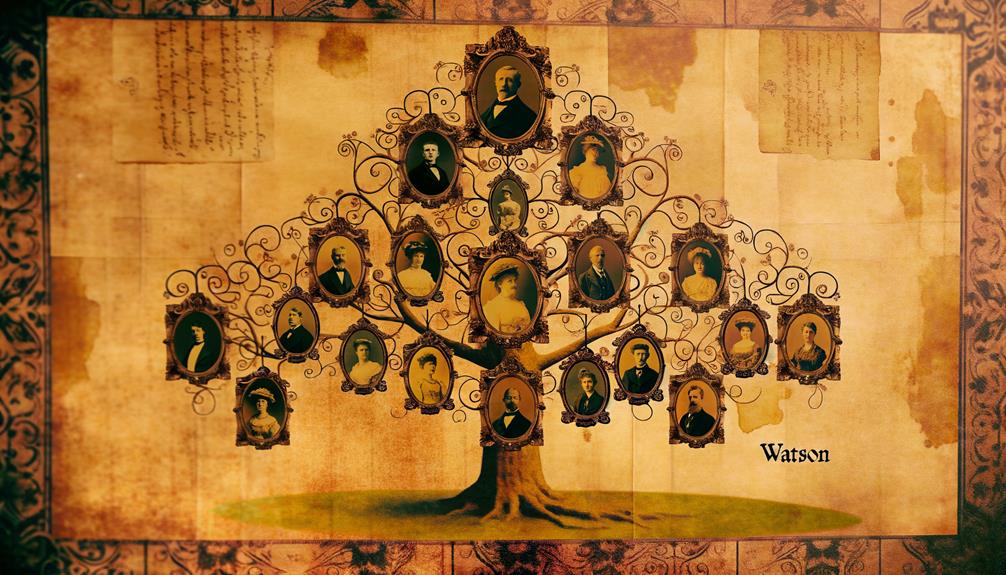Watson Name Meaning and Origin
The surname Watson originates from the medieval diminutive "Wat," itself derived from the given name Walter. Walter is composed of Old Germanic elements: 'wald' (rule) and 'heri' (army).
The addition of the patronymic suffix 'son' indicates "son of Wat." First appearing in records during the 14th century, the name has roots in both England and Scotland, with significant historical presence in regions like Yorkshire and the Scottish Lowlands. Notable figures include James D.
Watson, co-discoverer of DNA's structure. Exploring its geographical spread, crests, and contributions highlights its rich history and enduring legacy.

Key Takeaways
- The surname Watson means 'son of Wat,' with Wat being a diminutive of Walter.
- Walter is derived from Old Germanic elements 'wald' (rule) and 'heri' (army).
- Watson first appeared in medieval records during the 14th century.
- The surname is historically concentrated in Northern England and Scotland.
- Watson has notable figures like James D. Watson and Thomas J. Watson.
Etymology of Watson
The surname Watson originates from the medieval given name Wat, a diminutive form of Walter, combined with the patronymic suffix 'son,' indicating 'son of Wat.'
The name Walter itself derives from the Old Germanic elements 'wald,' meaning 'rule,' and 'heri,' meaning 'army,' signifying a leader or ruler of the army.
During the medieval period, it was common for surnames to evolve from given names, especially through the use of diminutives and patronymic forms.
Consequently, Watson emerged as a way to identify individuals as descendants of someone named Wat.
This practice reflects the broader socio-cultural trend of using family lineage and occupation to distinguish individuals within growing communities, contributing to the rich tapestry of surname origins in English history.
Early Historical References
The surname Watson first appears in medieval records during the 14th century, with notable mentions in English and Scottish documents.
These early references provide insights into the geographical distribution and social status of individuals bearing the name.
Over time, the evolution of the surname reflects broader historical trends, including migration and linguistic changes.
Medieval Records and Mentions
Medieval records reveal that the Watson surname first emerged in England during the 13th century, with documented instances in various legal and ecclesiastical texts.
Especially, the 1279 Hundred Rolls, a census-like survey commissioned by King Edward I, lists several individuals bearing the name 'Watson' across different counties.
Additionally, church registers from the period frequently mention the surname in connection with tithing and land agreements. These early references indicate that the name was well-established among the yeoman and merchant classes.
The consistent presence of the Watson surname in these documents underscores its significance and prevalence in medieval English society, providing valuable insights into the socio-economic conditions and familial structures of the time.
Surname Evolution Over Time
As the Watson surname firmly established its roots in medieval England, its evolution over time can be traced through various historical references that highlight its adaptation and persistence across centuries.
Early mentions in the 13th century, such as in the Yorkshire Poll Tax records of 1379, where names like 'Richard Watkynson' appear, demonstrate the surname's early use. The patronymic nature of Watson, deriving from 'Wat' or 'Walter,' signifies the familial lineage.
Over time, the name evolved phonetically and orthographically, adapting to regional accents and spelling conventions. By the 16th century, Watson had become a distinct and widespread surname, appearing in legal documents, parish records, and tax rolls, reflecting its entrenched status in English societal and familial structures.
Watson in Scotland
Throughout Scottish history, the surname Watson has been associated with various notable clans and families, reflecting its deep-rooted significance in the region. The name Watson, derived from 'Wat,' a diminutive of Walter, became particularly prominent in the Scottish Lowlands. Historical records indicate its presence in several key events and locations:
- Resilience in the face of Highland conflicts
- Contributions to the Scottish Enlightenment
- Participation in the Jacobite uprisings
- Involvement in the Covenanters' struggle for religious freedom
- Legacy within the Scottish diaspora
These associations not only highlight the Watsons' adaptability and resilience but also their integral role in shaping Scotland's social and political landscape.
The Watsons' historical footprint in Scotland reveals a tapestry of loyalty, intellect, and enduring cultural influence.
Watson in England
In England, the surname Watson has historical roots dating back to medieval times, with its evolution influenced by various socio-political events.
The name's regional distribution patterns indicate a significant concentration in northern counties, particularly Yorkshire and Lancashire, reflecting historical migration and settlement trends.
Analyzing these patterns offers insights into the socio-economic factors that shaped the proliferation and establishment of the Watson surname in England.
Historical Roots and Evolution
The surname Watson, derived from the patronymic form of the name Wat or Watt, traces its origins to medieval England, where it evolved from the given name Walter. This evolution highlights the socio-cultural transformations of that era, reflecting the nuanced intersection of personal identity and lineage.
The adoption of surnames became more prevalent post-Norman Conquest, serving essential administrative and legal functions.
Heritage: A reflection of familial lineage spanning centuries.
Identity: A personal marker rooted in historical significance.
Pride: A symbol of ancestral achievements and resilience.
Connection: A tie to England's medieval societal structures.
Legacy: A narrative thread woven into the fabric of history.
Understanding Watson's historical roots provides invaluable insights into the broader tapestry of English nomenclature.
Regional Distribution Patterns
Examining the regional distribution of the Watson surname within England reveals distinct patterns that mirror historical settlement trends and socio-economic developments. Mainly, the surname is concentrated in the northern counties, notably Yorkshire and Lancashire. This can be attributed to the Viking and Anglo-Saxon influences in these regions, where the name likely evolved.
Industrialization further cemented its presence in these areas due to the migration of laborers during the 18th and 19th centuries. In contrast, southern counties such as Kent and Sussex exhibit a lower frequency of the Watson surname. This distribution pattern provides insights into historical population movements and economic activities, reflecting how regional developments have shaped the demographic landscape of surnames in England.
Notable Watson Figures
Throughout history, numerous individuals bearing the Watson surname have achieved prominence in various fields, contributing significantly to the arts, sciences, and public life. Their legacies reflect a rich tapestry of human endeavor and intellectual pursuit.
- James D. Watson: Co-discoverer of the DNA double helix structure, revolutionizing molecular biology.
- Thomas J. Watson: Long-serving IBM CEO, pivotal in transforming the company into a global technology leader.
- John Watson: Founding figure in behaviorist psychology, reshaping the study of human behavior.
- Emma Watson: Renowned actress and activist, advocating for gender equality and education.
- William Watson: Esteemed poet and critic, his works capturing the essence of Victorian and Edwardian England.
Such figures underscore the significant impact of the Watson name across generations.
Watson in Popular Culture
In popular culture, the Watson name has been immortalized through a diverse array of characters and narratives. Most prominently, Dr. John Watson stands out as the steadfast companion of Sherlock Holmes in Sir Arthur Conan Doyle's legendary detective series. Dr. Watson's role as the narrative voice and loyal friend has cemented his place in literary history, setting a standard for sidekick characters in subsequent detective fiction.
Beyond literature, the name has found resonance in various media, including film, television, and radio adaptations. These adaptations continually evolve yet retain the core attributes of loyalty and intellect associated with the Watson name. Moreover, the Watson name appears in contemporary works, such as the AI system IBM Watson, symbolizing advanced problem-solving and data analysis. This usage extends the cultural significance of the name across different domains.
Watson Family Crests
The heraldic tradition of the Watson family crests, which dates back to medieval times, encapsulates a rich tapestry of ancestral pride, symbolic imagery, and dynastic heritage. Each crest is a visual narrative, often featuring distinctive elements such as shields, helmets, and mottos that reflect the family's values and history.
Examining these crests reveals:
- Lions rampant: Symbolizing courage and nobility.
- Stags: Representing peace and harmony.
- Chevron patterns: Indicating protection and faithful service.
- Swords: Denoting military honor and readiness.
- Mottoes: Expressing guiding principles and family ethos.
These artistic and symbolic elements serve as a testimony to the Watson lineage, preserving stories of valor, loyalty, and legacy for future generations.
Modern-Day Watson Distribution
Extending from its heraldic roots, the Watson surname has proliferated globally, with contemporary distributions illustrating a significant presence in countries such as the United States, the United Kingdom, Canada, and Australia. Historically concentrated in Scotland and Northern England, the Watson name spread through colonial and migratory movements.
In the United States, significant populations are found in states like California and Texas, reflective of general migration patterns. In the United Kingdom, it remains strongly rooted in Yorkshire and surrounding areas. Canadian Watsons are prominently present in Ontario, while in Australia, the surname is widespread across New South Wales and Victoria.
This modern distribution underscores a rich historical tapestry of movement, settlement, and cultural integration, resonating with global migratory trends.
Conclusion
The chronicles of the Watson name weave a rich tapestry through the annals of history, from its etymological roots to its widespread modern distribution.
A name borne by figures of note and etched into popular culture, Watson carries the weight of centuries of heritage.
Its presence in both Scotland and England underscores a storied legacy, mirrored by the heraldic symbols of Watson family crests.
Therefore, the name Watson stands as a lighthouse of historical and cultural significance.






